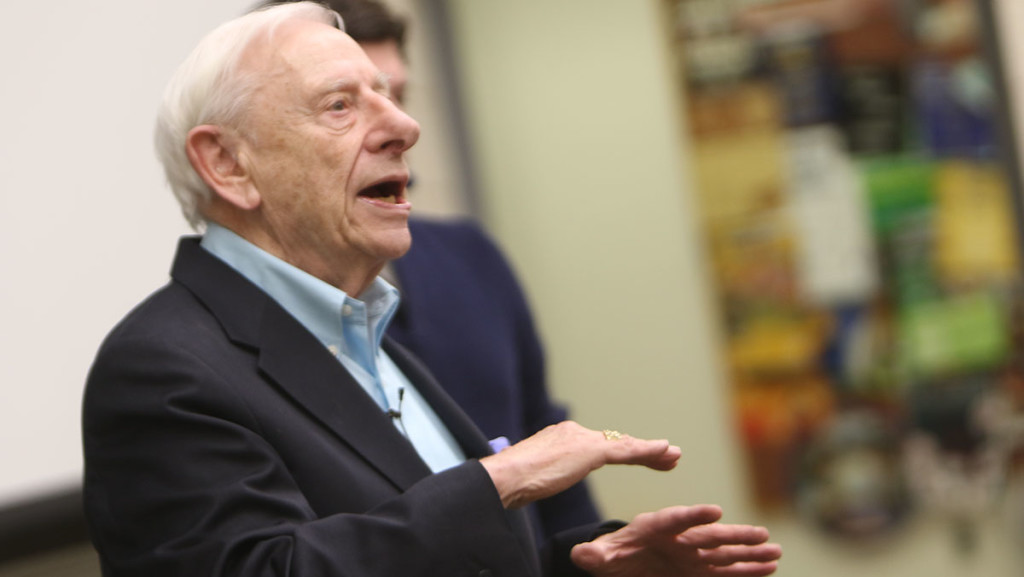Ithaca College junior Howard Goldberg met now-87-year-old Holocaust survivor Fred Heyman nine years ago on a bus to Washington, D.C., through a Morris Rubell Remembrance Journey — a program dedicated to educating youth on the Holocaust. Goldberg went on the journey with a group of friends and Heyman, who became his “twin.”
“What twinning means is since he couldn’t have a bar mitzvah in the Holocaust, I shared mine with him,” Goldberg said. “He told me his story, and I promised to retell it in 2045, which is the hundredth anniversary of the Holocaust ending.”
The friendship continued, and ultimately, Goldberg produced a documentary about Heyman’s life and his impact on others. At 7 p.m. April 5, Goldberg introduced Heyman to a group of approximately 100 students and faculty of the college before he screened his documentary, titled “Be an Upstander,” which tells Heyman’s story.
“Be an Upstander” recounts the life of Heyman growing up in Berlin, Germany, during World War II and his challenging transition to the U.S. Heyman’s father was Jewish, and his mother was Protestant. His school and temple were burned down when he was in the third grade, ending his access to education until he came to Milwaukee, Wisconsin, as a teenager and attended high school. Studying in the U.S., Heyman faced discrimination for his lack of education and inability to speak English.
During the discussion, Heyman said it was tragic how many good people stood as bystanders during the Holocaust, blindly obeying authority. Heyman said the opportunity given to him to educate young people allows him to be what he calls an “upstander.”
The documentary — which premiered in 2015 and was Goldberg’s first film — focused on how Heyman has used his experience of surviving the Holocaust in Germany to teach people about how they can act in their everyday lives to help people. Goldberg said he sees Heyman as an example of his message to be an upstander.
Hyman spends most of his time educating youth on how they can stand up to injustice instead of being a bystander. In the film, many of Heyman’s “twins,” in addition to Goldberg, said they feel he exemplifies his motto of being an upstander through educating them. Much of his educating is done on bus trips with youth to the United States Holocaust Memorial Museum in Washington, D.C., where he originally met Goldberg.
“He’s just made me more vigilant,” Goldberg said. “Be vigilant, do good, and at the end of the day, hope that the good outweighs the bad.”
After the screening, Heyman spoke to the audience for 45 minutes about how his experience relates to his message of being an upstander.
Heyman said he tells his story because he believes stories of tragedy and human rights violations are not often told. He cited recognition last month by the U.S. to acknowledge the Armenian Genocide after 100 years, as a step in the right direction, but occurring too late. He encourages people to learn about, and have compassion for, what others have gone through.
“Put your arm around a person being attacked,” he said. “It makes a better world.”
Heyman said he is thankful to have met Goldberg and that he is proud to have been able to influence and leave his legacy with him, as a friend and as a twin.
“He shared his bar mitzvah, and I shared my story with him,” Heyman said.
Sam Schloss, a senior at the college who attended the event, said it is important to listen to Heyman because it helps people appreciate their own lives and motivates them to help others. He said Heyman offers a valuable message, which could be lost as fewer survivors are alive to tell their stories.
“He’s able to share impacts from his life that makes it easier for everyone to go through theirs,” Schloss said. “We have to fill his shoes the best we can because there are so many people that are lost and only a few that are left to tell the tale.”
Kayla Reisman, director of Jewish student life for Hillel — the Jewish community at the college — helped Goldberg create the event. She said she appreciates Heyman’s message because it encourages people not to be bystanders in a number of ways.
“Oftentimes, we’re bystanders, and we see things happening around us, and we don’t do anything about it,” she said. “But to be an upstander, as Fred and Howard call it, is to not be passive when things are happening around you, but to be noticing them and responding to them. … If there had been more upstanders during the Holocaust, maybe not as many people would have died.”








